About this time a century ago, the “war to end all wars” was over. Some 17 million people died in World War I, along with 23 million wounded. Germany had been defeated along with its ally Bulgaria, and the Ottoman and Austro-Hungarian empires were history. They, the losers, could only wait to see what the victors (the United States, France and England, for the most part) had planned for them at the Paris Peace Conference. It opened on January 18, 1919 and did not close until the League of Nations was inaugurated on January 16, 1920, concluding with the Treaty of Versailles.
More than 400 people had official roles at the conference, and the key figures were Georges Clemenceau and David Lloyd George—the French and British prime ministers, respectively—and U.S. president Woodrow Wilson; the Americans, late to enter the war, made the crucial difference. The League of Nations, Wilson’s pet project, was among his so-called Fourteen Points, idealistic principles of 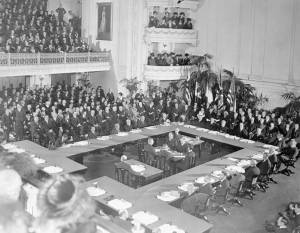 post-war peace. The stickiest pertained to self-determination. That would not be easy when France and Britain were trying to hold onto their vast empires, and the U.S. wanted to maintain the Monroe Doctrine in the western hemisphere. Furthermore, what might constitute self-determination in the Balkans? What about the Kurds? A homeland for Zionist-minded Jews (well represented by Chaim Weizmann)? Poland (Ignacy Paderewski), Greece (Eleftherios Venizelos), China (Wellington Koo), Syria (Faisal I bin Hussein bin Ali al-Hashemi) and other countries had legitimate claims, pressing them with various degrees of effectiveness.
post-war peace. The stickiest pertained to self-determination. That would not be easy when France and Britain were trying to hold onto their vast empires, and the U.S. wanted to maintain the Monroe Doctrine in the western hemisphere. Furthermore, what might constitute self-determination in the Balkans? What about the Kurds? A homeland for Zionist-minded Jews (well represented by Chaim Weizmann)? Poland (Ignacy Paderewski), Greece (Eleftherios Venizelos), China (Wellington Koo), Syria (Faisal I bin Hussein bin Ali al-Hashemi) and other countries had legitimate claims, pressing them with various degrees of effectiveness.
Clemenceau, Lloyd George and Wilson, their assertions to the contrary notwithstanding, were Eurocentric. Most of all, they wanted to punish Germany and prevent its military resurgence. Reparations were called for and national boundaries were re-drawn, pleasing some entities and drawing howls of protest from others. Countries uninvited to Paris could not officially present petitions. Nevertheless, Blaise Diagne of Senegal and W.E.B. Du Bois of the U.S. organized a Pan-African Congress in Paris that went on for most of February. Ireland and Tonga—yes, Tonga—found ways to make their views known. A pastry chef at the Ritz Hotel named Ho Chi Minh borrowed a suit from a French friend and delivered a petition demanding independence for Vietnam.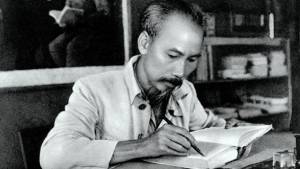
Japan, the rising power in the east, had sent a large delegation under Makino Nobuaki. Clemenceau, Lloyd George and Wilson often discussed the Japanese and how to handle them. One surviving memo emphasized that “Japan’s dignity should not be offended.”
This brings us to Korea, a country of which Japan was the colonial master. Recall the “Taft-Katsura Agreement” of 1905 by which Japan acknowledged the United States’ control of the Philippines (in the aftermath of the Spanish-American War), and the Americans reciprocated by saying Japan’s hold on Korea was valid.
As is well known, the March 1st independence movement in Korea was sparked by the perhaps naïve belief that Wilson’s call for self-determination applied even to a remote little country in East Asia. The Shanghai-based Korean Provisional Government, created soon thereafter, was riven by factions. Even if it had not been, the big powers did not want notorious men like Syngman Rhee or Kim Gu of the KPG to come to France and so visas were denied.
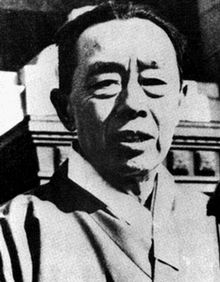 Kim Gyu-sik, another fervent Korean nationalist, was the KPG’s foreign minister but that was hush-hush. Calling himself a representative of the Korean YMCA, he and two others traveled to Paris in May 1919. Denied any opportunity to speak to the decision-makers, they had to settle for a quick meeting with Stanley Hornbeck, a minor American diplomat. Kim handed Hornbeck two documents: the “Petition of the Korean People and Nation for Liberation from Japan and for the Reconstitution of Korea as an Independent State” and the “Claims of the Korean People and Nation.” Hornbeck took them but made clear that he was in no position to make any promises. Wilson never saw the documents. Nobuaki, needless to say, was vexed to hear about the presence of a Korean delegation.
Kim Gyu-sik, another fervent Korean nationalist, was the KPG’s foreign minister but that was hush-hush. Calling himself a representative of the Korean YMCA, he and two others traveled to Paris in May 1919. Denied any opportunity to speak to the decision-makers, they had to settle for a quick meeting with Stanley Hornbeck, a minor American diplomat. Kim handed Hornbeck two documents: the “Petition of the Korean People and Nation for Liberation from Japan and for the Reconstitution of Korea as an Independent State” and the “Claims of the Korean People and Nation.” Hornbeck took them but made clear that he was in no position to make any promises. Wilson never saw the documents. Nobuaki, needless to say, was vexed to hear about the presence of a Korean delegation.
Before leaving Paris, Kim gave a speech. Where he spoke and to whom is uncertain, but he stated his disappointment with the lukewarm reception he had gotten. He asked whether Woodrow Wilson meant what he said about self-determination and criticized the French who pretended to love justice but cared 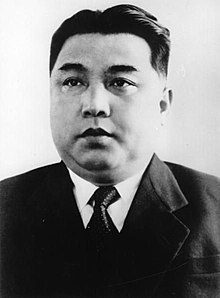 little about 20 million Koreans suffering under Japanese colonial oppression. Kim may have mentioned that some of the people the Japanese had arrested, thrown into Seodaemun Prison and tortured said they had stood up for Korean independence only because they took Wilson at his word.
little about 20 million Koreans suffering under Japanese colonial oppression. Kim may have mentioned that some of the people the Japanese had arrested, thrown into Seodaemun Prison and tortured said they had stood up for Korean independence only because they took Wilson at his word.
Kim was among 52 Koreans who, in 1922, participated in the First Congress of Toilers of the Far East in Moscow. Hosted by Vladimir Lenin, it was all about revolution, Communist-style. Frustrated and resentful over what he had seen in Paris, Kim wrote an article blasting the hypocritical Americans, French, British and Japanese, calling them “bloodsucker” nations. This was the start of the Korean Communist movement, and when Kim Il-sung disembarked from a Soviet ship at Wonsan 23 years later he beheld fertile ground. He would take bloodsucking to an entirely new level.
Poor Kim Gyu-sik! After division of the peninsula in 1945, he tried and failed to broker reunification (including a gutsy visit to Pyongyang in April 1948). With the outbreak of the Korean War two years later, he was abducted, hauled to the North and killed.

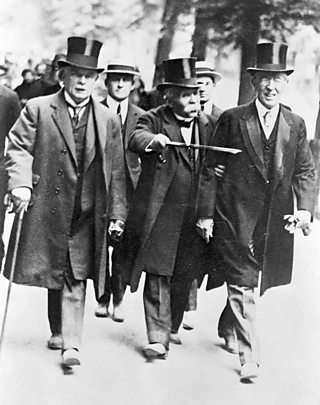
6 Comments
This is a very clear overview of the 1919 peace talks post WWI, and I am very much in appreciation of your explanation because I have never been exposed to such a simplified viewpoint, especially from the standpoint of the Korean Kim Il-sung. I never realized that what occurred in Europe had drastic effects in the far east.
It is clear, wisdom and fairness in world politics does not exist, as you have notably explained. Though not part of your article, obviously the Germans got a bad deal, since the unreasonably and impossibly high reparations imposed on Germany lead directly to the financial meltdown of Germany’s economy, namely the valueless Mark (currency of Germany) and thus led up to the rise of Hitler.
Being fair-minded for all the various countries in post war peace talks is problematic, especially if your country is not given a seat at the “peace-talk” table.
For all the trips you have taken in and around South Korea on missions to visit historic sites, the history which you’ve learned about Korea and passed on to your readers, nothing is more shocking to me than to learn that Monroe, the stalwart “self-determinist” was part of the unfortunate demise of Korea, especially with North Korea being boot-strapped by Russia with the subsequent brutal and evil reign of the communism under the “Kim’s”.
Such words make me realize that my efforts are not wasted–so thanks, Gary. I know at the bottom you were referring to Wilson the “self-determinist” and not Monroe. Clemenceau and Lloyd George were just playing along with him, grateful that the USA had come along and saved their butts (as we would again 20 years later). As for whether a nicer welcome for the Koreans would have prevented the rise of Kim Il-sung…maybe!
Richard-Thanks for writing about the 1919 Paris Peace Conference and from a Korean perspective, as usual it was very enlightening. What disaster for Koreans and the rest of the world. It led to WWII and the horrors of communism that followed in China, Russia, eastern Europe as well as countries all over the world with Korea being a foremost example. Great insights-thanks.
Well, this was a vastly complicated story and I could only try to show how it seems to me. One thing I should have mentioned is that there were some “junior” men who would later become very prominent: DeGaulle, Churchill, Hoover, Roosevelt, Ataturk, Mussolini, et al.
Richard- I was familiar with the Versailles Treaty and the war reparations imposed on Germany, but was unaware that other nations requested assurances of the status of independence. If Korea’s wish had been granted, they probably would have avoided this division and virtual enslavement in the north. Our colonial history has left us with a lot of blood on our hands.
Bob: Yes, as mentioned in one of the above comments, things might have turned out quite differently here if the big powers had just a bit more knowledge and foresight. Not to defend them, but they were swamped with decisions to make. Here is an interesting little fact…Bolivia, Uruguay, Peru and Ecuador were part of the Paris Peace Conference! They had come out on the side of the Allies during the war and thus got a place at the table.
Add Comment